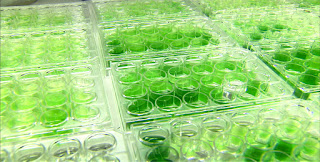Yet the honeybee population in Israel is holding steady.
Israel takes measures to ensure that its bee population declines no more than 10 percent each year, compared to 30%-50% in the United States, where the problem is so severe that Häagen-Dazs ice cream has donated $1 million to honey bee research since 2008, and President Obama initiated a national strategy to promote bee health.
Israeli Honey Board helps Israel’s 500 beekeepers implement innovative tactics to support a collective of 110,000 hives. (The slight reduction in bees does not affect Israel’s honey supply because each year more colonies are introduced to offset the loss. Climate is the main variable in reaching an ideal annual yield of 3,000 tons.)
The first step in avoiding CCD is to follow Ministry of Agriculture guidelines for eradicating Varroa mites, a parasite considered a core cause of CCD.
But another significant strategy for healthier bees and tastier honey are the 80,000 to 100,000 seedlings – especially eucalyptus trees – planted every year to give bees a varied, abundant diet across the seasons despite the loss of open areas to urbanization.
The flavor and texture of the honey vary according to the type of blossoms from which the bees gather nectar. Most honey sold in Israel contains a mixture from sources including orange, plum, eucalyptus, za’atar, avocado, carob and thyme.
These seedlings are provided free by the nurseries of Keren Kayameth LeIsrael-Jewish National Fund (KKL-JNF). No other country gives away nectar-rich plants and trees.
Some plantings serve a double purpose. The Honey Board worked with the Ministry of Defense to plant eucalyptus along the Gazan and Syrian borders, for example, to nourish bees while protecting those areas from hostile fire.
Beekeepers have land but don’t have enough flowers and shrubs to attract bees. So over the past 15 to 20 years KKL-JNF has been cooperating with organizations like the Honey Board to make Israel greener and help beekeepers attract bees at the same time.
Beekeepers say the effect of this project is revolutionary. Previously they had to spread hives across the country to maximize feeding areas, leading to problems of theft and high costs for transportation. Now their bees are close to home and can be better guarded.
And thanks to winter flowering species introduced by the KKL-JNF, beekeepers rarely have to feed the bees with sugar water in cold months, a practice that is costly, not as healthful for the bees and doesn’t produce the best honey.
With funding from the Israeli Honey Board, the KKL-JNF recently released an English translation of its catalog listing nectar-rich seedlings for beekeepers. There is great interest from professionals from other countries who have seen Israel’s presentations at international conferences.
The catalog lists many varieties of eucalyptus as well as trees and shrubs such as tamarisk, broad-leaved bottle tree, Syrian ash, rosewood, and arroyo sweetwood.
Israel is providing training to the domestic and foreign beekeepers.
Researchers from India’s Nimbkar Agricultural Research Institute came to the KKL-JNF National Seed Center in Beit Nehemia last November and again this month to learn tips on growing eucalyptus and other flowering plants for better honey production. The KKL-JNF has also sent seedlings to Jordanian beekeepers in the past.
Source: Israel21c


